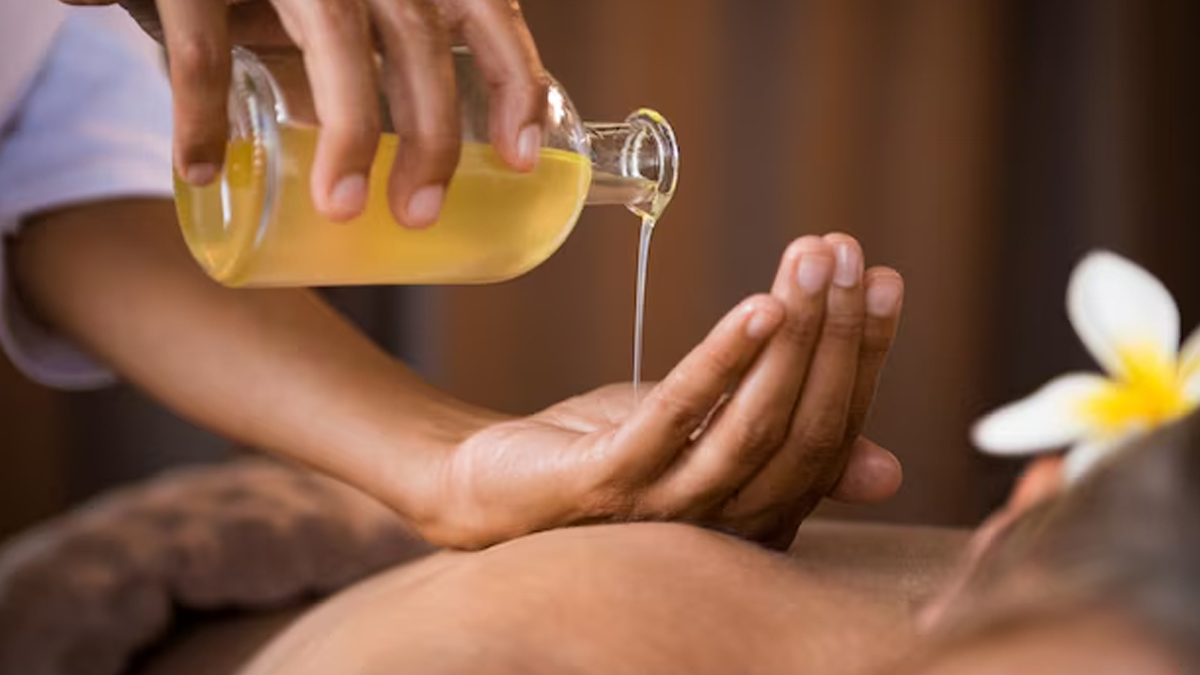
Abhyanga is an ancient Ayurvedic self-massage therapy that uses warm oils to nourish the body and calm the mind. Rooted in India’s 5,000-year-old holistic healing system, this practice is believed to boost immunity, improve circulation, and reduce stress. But is it safe for pregnant women?
Table of Content:-
Pregnancy is a delicate phase, and mothers-to-be often seek natural therapies for relaxation and wellness. Abhyanga, when done correctly, may offer benefits like reduced swelling, better sleep, and emotional balance. However, safety depends on factors like oil choice, massage techniques, and individual health conditions. Regarding the same, an expert shared Abhyanga’s benefits and step-by-step guidelines.
What Is Abhyanga?
View this post on Instagram
Abhyanga is a daily Ayurvedic self-massage using warm oils. It involves gently rubbing oil over the body to lubricate joints, improve blood flow, and remove toxins. According to Ayurveda, it balances three body energies (Vata, Pitta, Kapha) and promotes longevity. Dr Ashutosh Shukla, Managing Director, Indian Sages Ayurveda Pvt. Ltd, Delhi, explains how Abhyanga works: “It rejuvenates the body and relaxes the mind by balancing your doshas (body energies).” However, he stresses the importance of personalised approaches, especially during pregnancy.
The expert added, “Abhyanga is not just physical care, it’s a meditation that connects you to your body.” The oils used vary based on your dominant dosha, making the practice customisable.
Is Abhyanga Safe for Pregnant Women?

Abhyanga can benefit pregnant women but needs caution. Some of its pros and cons, as per the expert’s feedback are mentioned below.
Pros:
- Reduces stress and anxiety.
- Improves blood flow, reducing leg cramps.
- Moisturises stretching skin, easing itchiness.
Cons/Risks:
- Wrong Oils: Avoid strong oils like mustard (may overheat).
- Pressure Points: Skip the abdomen and lower back unless guided.
- Slippery Surfaces: Risk of falls post-massage.
Safety Tips:
- Consult Your Doctor: Ensure no high-risk conditions.
- Use Mild Oils: Coconut or sesame are safer choices.
- Gentle Strokes: Focus on legs, arms, and shoulders.
- Ask Experts: Seek Ayurvedic practitioners trained in prenatal care.
Benefits of Abhyanga
Regular Abhyanga offers many benefits:
- Reduces Stress: Warm oil calms the nervous system.
- Boosts Immunity: Oils strengthen the skin, a key immune barrier.
- Improves Sleep: Massage lowers cortisol, aiding relaxation.
- Enhances Skin Health: Oils combat dryness and slow ageing.
- Supports Joints: Lubrication eases stiffness and pain.
Dr. Shukla adds, “It’s like giving your body a shield against daily stress.”
How to Perform Abhyanga
The expert gave a few tips for performing the Ayurveda massage technique, Abhyanga.
Choose Your Oil:
- Vata (dry/restless): Use almond or Bala oil.
- Pitta (heat-sensitive): Pick coconut oil.
- Kapha (sluggish): Opt for mustard oil.
- Warm the Oil: Heat slightly (not hot) for better absorption.
Massage Technique:
- Start at the head. Use circular motions with light pressure.
- Move to arms/legs with long strokes; use circles on joints.
- Spend 20 minutes, covering the entire body.
- Rest: Let the oil soak in for 15 minutes.
- Bathe: Rinse with warm water. Avoid soap to retain oil benefits.
Dr. Shukla advises, “Be gentle. This isn’t deep tissue—it’s about nurturing.”
ALSO READ: What Is Mitahar: The 50-25-25 Rule? Tips To Beat Bloating and Gas Issues
Conclusion
Abhyanga is a powerful self-care ritual. For pregnant women, it can offer relaxation and physical ease—if done mindfully. Always prioritise safety: choose gentle oils, avoid sensitive areas, and consult experts. As Dr. Shukla said, “Listen to your body. It knows best.”
Also watch this video
Read Next
How Can Having Acidic Burps Late At Night Impact Your Sleep? Ayurvedic Doctor Shares Tips For Relief
How we keep this article up to date:
We work with experts and keep a close eye on the latest in health and wellness. Whenever there is a new research or helpful information, we update our articles with accurate and useful advice.
Current Version